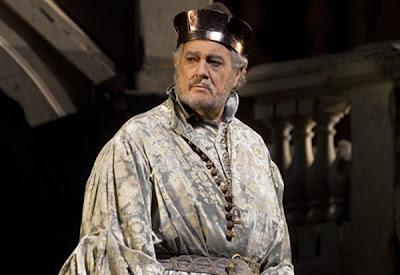Sir Georg Solti grabs his head.
Richard Strauss and Hugo von Hofmannsthal wrote six operas together. Their two great romantic comedies,
Der Rosenkavalier (1911) and
Arabella (1932) are great-great grandfathers of the romantic comedies and so-called 'chick flicks' that fill the multiplexes today. It is small wonder that last Saturday's matinee performance of
Rosenkavalier was not only sold out in the house, but filled movie theaters across the country as well in its live high-definition telecast.

The two operas were written 21 years apart, yet have much in common.
Der Rosenkavalier is a classic romantic triangle, with an older, married woman handing off her young lover Octavian to Sophie, a girl of more suitable age. Complications arise with the arrival of the boorish country cousin Baron Ochs who has arrived in town to marry Sophie, whose approach to seduction involves milk stools, haystacks, and being quicker than his prey. Through a series of deceptions, (and Octavian's cross-dressing) the Baron is sent home empty-handed and the young lovers are together as the curtain falls.
Arabella puts a fresh twist on its older brother. Also set in Vienna, here the titular leading lady winds up with the baritone from the country! Mandryka is a decent sort befuddled by the "sophisticated" Viennese. He woos Arabella, who comes from a family so poor that the parents force her younger sister Zdenko to cross-dress as a boy (Zdenko) in order to spare the family the expense of introducing two young ladies into Viennese society. Much misunderstanding abounds, but in the end everything wraps up happily.

Although these two fine comedies are best experienced in the theater, a pair of classic recordings have recently been re-issued. Both are conducted by Sir Georg Solti, leading the Vienna Philharmonic, an orchestra that always sounds happiest playing Strauss' music. This
Der Rosenkavalier
features a solid trio of leads, with Regine Crespin, Yvonne Minton and Helen Donath all giving commendable performances. Solti leads an absolutely un-cut performance of the score, recorded in the magnificently restored 24-bit Decca sound. And look out for Luciano Pavarotti, he makes a brief appearance in Act I as the Italian Singer.
The
Solti Arabella
has been a staple of the catalogue for many years. Lisa della Casa and George London are more than capable in the leads. She made the role of Arabella something of a specialty--it lies perfectly for her silvery voice and yet she makes 'Bella into a real, three-dimensonal woman who blossoms to full adulthood as the opera progresses. London's voice is at its peak here, with none of the wear that characterized his later performances. And Hilde Gueden is a compelling Zdenka/Zdenko, trapped between genders and desperate. Both recordings are now available at mid-price in the Decca Originals series, and are an excellent addition to any serious opera collection.




+(Box).jpeg)






















